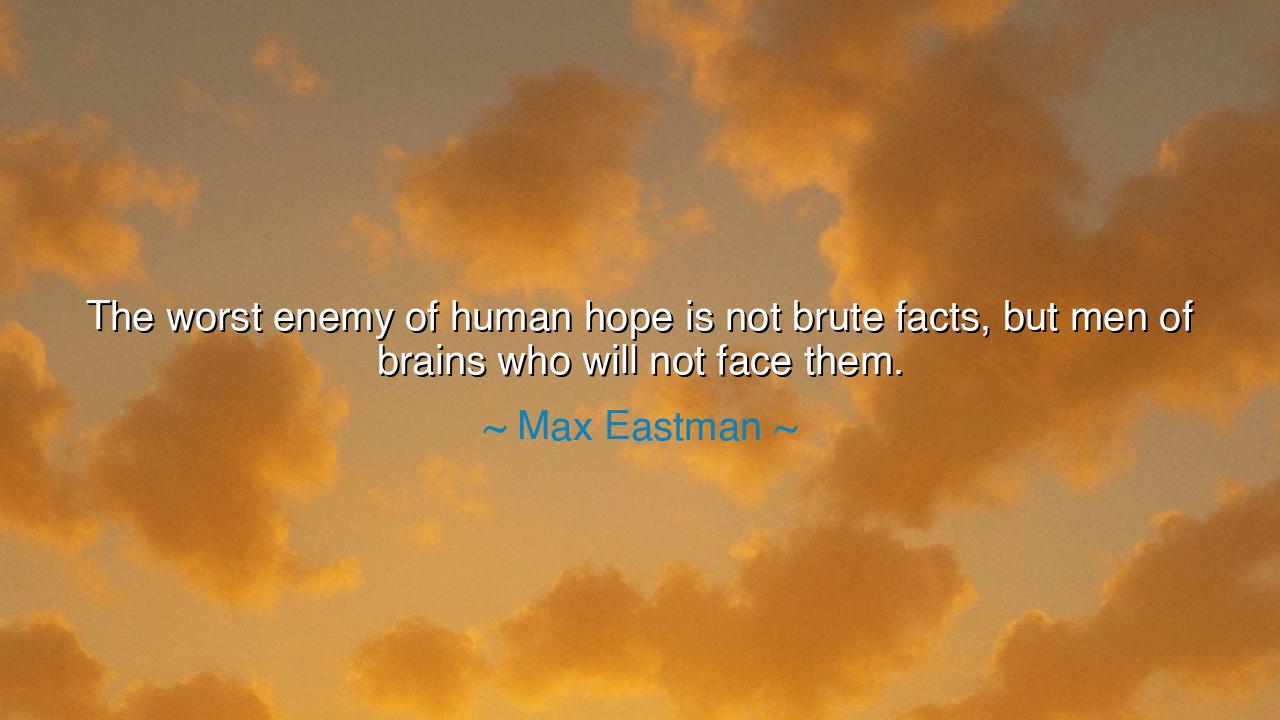
The worst enemy of human hope is not brute facts, but men of
The worst enemy of human hope is not brute facts, but men of brains who will not face them.






“The worst enemy of human hope is not brute facts, but men of brains who will not face them.” Thus spoke Max Eastman, the poet, critic, and philosopher of the early twentieth century — a man who stood at the crossroads between art and truth, between the spirit and the intellect. In this sentence, he strikes at the very heart of a timeless human failure: the refusal of reason to confront reality. Eastman’s warning is not against ignorance, but against intelligence misused — against those who, gifted with insight, choose instead to look away. For, he reminds us, truth does not destroy hope; only deceit does. It is not the facts that break the human spirit, but the cowardice of those who will not bear to face them.
Max Eastman lived in an age of great ideological struggle. Born in 1883, he saw the rise and fall of movements that promised heaven on earth, only to bring blood and tyranny instead. He himself was once an ardent socialist, believing that reason and justice could remake the world — yet, as he watched the horrors of Soviet oppression unfold, he turned from blind idealism toward sober truth. It was in this awakening that he penned such words as these, forged from the pain of betrayed dreams. He saw that the gravest danger to human hope came not from the harshness of reality, but from the intellectual dishonesty of those who twisted truth to protect their ideologies. Thus, Eastman became a defender not of comfort, but of clarity.
His words are as relevant now as they were in his time. The “brute facts” — the raw realities of existence — may wound us, but they are also the only ground upon which true hope can stand. It is not the storm that destroys the ship, but the navigator who refuses to read the stars. Likewise, in every age, there are those who refuse to face the facts of human nature, who prefer illusion to understanding, dogma to truth. They wrap falsehood in noble language, preaching progress while denying corruption, or promising peace while feeding hatred. These are the men of brains who will not face reality — and by their denial, they poison the well of hope for all mankind.
History is filled with their shadows. Think of the Soviet Union in the time of Stalin, when millions were imprisoned, starved, and killed — yet the intellectuals of the West, dazzled by ideology, refused to believe the truth. They called it propaganda, they silenced the witnesses, they turned their pens against those who dared to speak. It was not ignorance that fueled this blindness, but pride — the unwillingness to admit that a beautiful theory had become a monstrous lie. By refusing to face the facts, they betrayed both justice and the very hope they claimed to defend. So it has ever been: the corruption of intelligence is the most dangerous of all corruptions, for it gives evil the mask of reason and falsehood the power of persuasion.
And yet, Eastman’s warning is not only for nations or thinkers — it is for every human soul. For within each of us lives the same struggle: the temptation to turn away from painful truths, to hide behind comforting illusions, to deny what we fear to confront. The man who refuses to see his own faults, the leader who denies his failures, the lover who ignores the signs of betrayal — each contributes to the slow decay of truth in the world. To face the facts is an act of courage, for truth is often sharp, and reality rarely bends to our desires. But only by facing it can we grow, heal, and build something that endures. Hope without truth is a mirage, but truth embraced becomes the seed of lasting hope.
Consider, for example, Abraham Lincoln, who faced the brutal facts of his age with eyes unflinching. When the nation was torn by slavery and war, he did not soothe the people with easy lies. He spoke of suffering, of duty, of the cost of freedom — and in doing so, he kept hope alive, not as illusion but as moral strength. He proved that to acknowledge darkness is not to extinguish light, but to give it purpose. Thus, the wise do not flee from reality; they transform it. The act of facing truth, however terrible, is itself the triumph of the human spirit.
So, my child, take this lesson into your heart: do not fear facts, but falsehood. When you see truth, even if it wounds your pride or shatters your illusion, embrace it, for only truth can heal what deceit destroys. Beware the clever mind that justifies its own blindness, for intelligence without integrity is a curse. Seek always to be among those who face reality — who love truth more than comfort, who prefer honest struggle to easy illusion. For such souls are the guardians of true hope, the builders of a world not made of dreams, but of courage. Remember Eastman’s wisdom: it is not the coldness of truth that kills hope, but the warmth of lies that smothers it. Face the facts bravely, and hope will not die — it will be reborn, purer and stronger, in the light of understanding.






AAdministratorAdministrator
Welcome, honored guests. Please leave a comment, we will respond soon